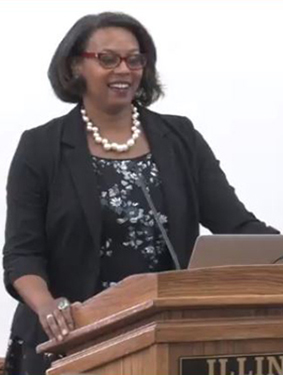On Monday, April 30, 2018, Dr. Kimberly A. Scott delivered the last campus lecture of the spring semester for the Dean’s Diversity Lecture Series, entitled “To Be Unapologetically ‘Ungoogley’: Why STEM Diversity Fails Women of Color.” Dr. Scott is a professor in the Women and Gender Studies Department at Arizona State University and executive director of ASU’s Center for Gender Equity in Science and Technology. Her most recent accomplishment, writing COMPUGIRLS: Becoming Ourselves in This Digital Age, which will be published by University of Illinois Press, derives from her work with COMPUGIRLS, a year-long after-school program in which participants from under-resourced school districts learn the latest technologies in digital media and programming.
Dr. Scott began the lecture by acknowledging that we all know there is a concern with the absence of women of color in STEM fields. She says although we all know this is an issue, we need to consider why this is the case. Many have pointed out motivation, interest, and “grit” as personals factors that contribute to the lack of women of color in these fields; however, Dr. Scott argues that is not the answer. Instead, the rhetoric surrounding this issue contributes to the lack of women of color in these fields.
She speaks on the theory of intersectionality in consideration to power, relationality, and context (Hill Collins & Bilge, 2016). She considers how intersectionality of these things acts as a “dialogical, activist process” that contributes to the incorporation of critical praxis and critical inquiry. This gives root to the discussion of power, especially when power can be skewed by data that people claim shows people of color present in their company or organization. Dr. Scott questions that data and asks if those women of color are actually holding powerful positions, such as executive or management positions. She also asks what happens to these women of color who complete their degrees in the workplace.
She reflects on findings from Gee and Peck (2017), which show that although people of color are occupying the same space in technology companies as other people, they do not have the same access to powerful positions. Also, findings from Williams, Phillips, and Hall (2014) show that although women of color receive their degrees in STEM and find employment, they are challenged with workplace aggressions. Ultimately, the context of one workplace does not consider the perspective of each individual. For example, their results show a large percentage of women of color must provide evidence to prove their competence more often than other people in similar roles. As a result, this contributes to the decline in women of color staying in these workplaces.
Dr. Scott then explains her understanding of critical praxis and critical inquiry and its connection with Google’s recruitment program with Historically Black Colleges (“HBCUs”). She explains Google individuals went to these campuses to teach students to be “Googley,” leading to potentially becoming workers at Google. Dr. Scott explains Google failed to understand the culture of the students and how HBCUs are being successful in graduating higher rates of students in STEM. Instead the Google representatives pushed for students’ success in spite of intimidating, difficult systems in technology companies.
Programs that promote this idea that people of color only need to have individual motivation in order to succeed in the competitive field of STEM often use what Dr. Scott calls the “Astronaut Approach.” These programs encourage people of color to use the gear and resources necessary to survive in a hostile environment, like an astronaut suit in space. This idea asserts that if only women of color could stay motivated in spite of the hostility in the workplace, then the environment would have more people of color, thus leveling the playing field for more people in the future. But this disregards the system’s faults as a hostile environment for women of color specifically. Dr. Scott explains there is no such thing as a level playing field; meaning just populating the STEM field with women of color neglects the importance of the intersectionality of power, relationality, and context in these STEM systems.
These ideas contribute to Dr. Scott and her colleagues’ design of COMPUGIRLS, a year-long program that would create an out-of-school community that draws on participants’ individual and community assets. While computer science courses like programming, digital storytelling, virtual worlds, and robotics are in the background, the girls focus on how they use themselves in creating a more impartial process and system for their future. This program incorporates mentors, teachers, peers, parents, and industry elements that teach the girls “power skills” to become “social change agents” (Scott, Sheridan, & Clark, 2015).
Finally, Dr. Scott ended the lecture by reading portions of her upcoming book to demonstrate the points made in the lecture. Overall, Dr. Scott charges us to realize that power can be invisible and unseen. Thus, as educators we must create coalitions that cross disciplines and boundaries, and as scholars we need to ask more complex questions about why women of color are absent in STEM and what changes need to be made, versus how many women there are in general.
References:
- Gee, B., & Peck, D. (2017). The iIlusion of Asian success: Scant progress for minorities in cracking the glass ceiling from 2007–2015. Ascend Pan-Asian Leaders. October.
- Hill Collins, P., & Bilge, S. (2016). Intersectionality (Key concepts). Cambridge, UK: Polity Press.
- Scott, K. (in press). COMPUGIRLS: Becoming ourselves in this digital age. Champaign, IL: University of Illinois Press.
- Scott, K. (2018). To be unapologetically "ungoogley": Why STEM diversity fails women of color. Presentation at the University of Illinois Dean’s Diversity Lecture Series, Urbana, IL.
- Scott, K. A., Sheridan, K. M., & Clark, K. (2015). Culturally responsive computing: a theory revisited. Learning, Media and Technology, 40(4), 412-436.
- Williams, J., Phillips, K. W., & Hall, E. V. (2014). Double jeopardy? Gender bias against women of color in science. WorkLife Law, UC Hastings College of the Law.
